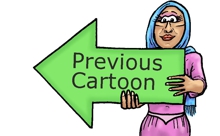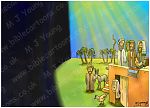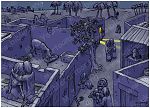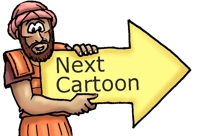Bible Cartoon: Exodus 12 - The Ten plagues of Egypt - The First Passover
Click on Add to cart button below shopping cart.
Purchased Bible Cartoons do not have watermarks. Links to Cartoons provided on email once purchase is completed.Bible Book: Exodus
Bible Book Code: 0201200101
Scene no: 10 of 11
Bible Reference & Cartoon Description
Exodus 12:1-28 (ANIV)
1 The Lord said to Moses and Aaron in Egypt, 2 “This month is to be for you the first month, the first month of your year. 3 Tell the whole community of Israel that on the tenth day of this month each man is to take a lamb [1] for his family, one for each household. 4 If any household is too small for a whole lamb, they must share one with their nearest neighbour, having taken into account the number of people there are. You are to determine the amount of lamb needed in accordance with what each person will eat. 5 The animals you choose must be year-old males without defect, and you may take them from the sheep or the goats. 6 Take care of them until the fourteenth day of the month, when all the people of the community of Israel must slaughter them at twilight. 7 Then they are to take some of the blood and put it on the sides and tops of the door-frames of the houses where they eat the lambs. 8 That same night they are to eat the meat roasted over the fire, along with bitter herbs, and bread made without yeast. 9 Do not eat the meat raw or cooked in water, but roast it over the fire—head, legs and inner parts. 10 Do not leave any of it till morning; if some is left till morning, you must burn it. 11 This is how you are to eat it: with your cloak tucked into your belt, your sandals on your feet and your staff in your hand. Eat it in haste; it is the Lord’s Passover.
12 “On that same night I will pass through Egypt and strike down every firstborn—both men and animals—and I will bring judgment on all the gods of Egypt. I am the Lord. 13 The blood will be a sign for you on the houses where you are; and when I see the blood, I will pass over you. No destructive plague will touch you when I strike Egypt.
14 “This is a day you are to commemorate; for the generations to come you shall celebrate it as a festival to the Lord—a lasting ordinance. 15 For seven days you are to eat bread made without yeast. On the first day remove the yeast from your houses, for whoever eats anything with yeast in it from the first day until the seventh must be cut off from Israel. 16 On the first day hold a sacred assembly, and another one on the seventh day. Do no work at all on these days, except to prepare food for everyone to eat—that is all you may do.
17 “Celebrate the Feast of Unleavened Bread, because it was on this very day that I brought your divisions out of Egypt. Celebrate this day as a lasting ordinance for the generations to come. 18 In the first month you are to eat bread made without yeast, from the evening of the fourteenth day until the evening of the twenty-first day. 19 For seven days no yeast is to be found in your houses. And whoever eats anything with yeast in it must be cut off from the community of Israel, whether he is an alien or native-born. 20 Eat nothing made with yeast. Wherever you live, you must eat unleavened bread.”
21 Then Moses summoned all the elders of Israel and said to them, “Go at once and select the animals for your families and slaughter the Passover lamb. 22 Take a bunch of hyssop, dip it into the blood in the basin and put some of the blood on the top and on both sides of the door-frame. Not one of you shall go out of the door of his house until morning. 23 When the Lord goes through the land to strike down the Egyptians, he will see the blood on the top and sides of the door-frame and will pass over that doorway, and he will not permit the destroyer to enter your houses and strike you down.
24 “Obey these instructions as a lasting ordinance for you and your descendants. 25 When you enter the land that the Lord will give you as he promised, observe this ceremony. 26 And when your children ask you, ‘What does this ceremony mean to you?’ 27 then tell them, ‘It is the Passover sacrifice to the Lord, who passed over the houses of the Israelites in Egypt and spared our homes when he struck down the Egyptians.’ “ Then the people bowed down and worshipped. 28 The Israelites did just what the Lord commanded Moses and Aaron.
[1]
The Hebrew word can mean lamb or kid; also in Exodus 12:4.
DRAWING NOTES:
TIME OF DAY:
This scene is set just after twilight.
LIGHTING NOTES:
The setting sun can just be made out in the sky & stars are beginning to shine. The sun’s feeble light can be made out illuminating the underside of the wooden shelter on the rooftop in the middle of the scene.
Lamp & fire light also illuminates this scene.
CHARACTERS PRESENT:
Various unnamed Hebrew people. The men are daubing lamb’s blood on the door posts & lintels of their homes, as per God’s instructions, sent via Moses. There is a young boy in the foreground, wondering what his father is doing! Similarly there is a bemused young girl, looking down at her father, from the wooden shelter on their homes rooftop.
RESEARCH/ADDITIONAL NOTES:
I didn’t need to do much research for this scene, just made it up from my imagination. I did discover that the plant named Hyssop in the Bible was probably Marjoram or Thyme, as Hyssop itself doesn’t grow in Israel.
I couldn’t find any reference of what Biblical ovens looked like, so I just had to invent a fictional one. The Bible does say that the entire lamb or goat had to be roasted over a fire, which is why I’ve depicted it being roasted whole over the coals.
Bible Doctrine Notes
12:1-28 HISTORY, Time (3.31A)
The Hebrew people attached importance to God’s mighty acts in history. Special meaning was attached to worship festivals celebrating agricultural achievements and the memories of God’s historical actions in their midst. Thus the Hebrew people celebrated the content of time, not merely its passage or duration. The Hebrew calendar was ordered according to the acts of God and the seasons. Israel is apparently the first nation to use a seven day worship week running from Sabbath to Sabbath. Israel depended on God to set time sequences (See Genesis 1:1-2:4).
12:1-13:16 CHRISTIAN ETHICS, Moral Imperatives (4.42C)
Personal obedience to God cements that person’s resolve in becoming a covenant follower of God. Obedience has the further benefit of communicating to future generations (through actions and word-of-mouth) that obedience is the best way to live. Obedience and celebration are two complimentary sides of life in covenant with God.
12:3-4 FAMILY, Worship (5.86B)
Families where commanded by God to prepare a Passover meal in preparation for their hasty departure from Egypt. This gave them sustenance for the journey and an opportunity to worship God through the blood sacrifice of the lamb. The Passover was a family celebration of the deliverance by God of the Hebrew people from slavery in Egypt. Family worship should form the unifying centre of the family. Although Christians no longer celebrate the Passover, we should find ways to teach children our beliefs in the setting of the family.
12:12 GOD, One God (1.11A)
As God finally broke Pharaoh’s resistence, He also brought judgement on Egypt’s gods, showing them to be worthless. In so doing He revealed Himself as the single, sovereign Lord of all creation.
12:24-27 EDUCATION, Symbolism (5.74H)
The Passover meal symbolises the Exodus from slavery in Egypt of the Hebrew people. Taste, touch, sight, smell and sound, as sensory experiences, powerfully contribute to a vivid and memorable learning experience, enabling small children to grasp significant truths in concrete form long before they are able to understand abstract ideas. In the breaking of bread and drinking of wine (Eucharist/Lord’s Supper), Christian’s similarly have a powerful teaching and learning opportunity.
12:27 ELECTION, Worship (4.14B)
Election leads the elect to worship. The Passover Feast operated as a powerful, historical reminder of God’s election action: destroying those who rejected Him, and delivering those who accepted Him. Worship looks to God’s mercy in election and deliverance, rather than in human pride.





